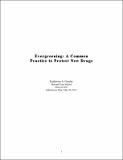| dc.contributor.advisor | Peter Hutt | en_US |
| dc.contributor.author | Gaudry, Katherine | |
| dc.date.accessioned | 2012-07-06T20:34:14Z | |
| dc.date.issued | 2011 | |
| dc.identifier.citation | Katherine Gaudry, Evergreening: A Common Practice to Protect New Drugs (May 2011). | en_US |
| dc.identifier.uri | http://nrs.harvard.edu/urn-3:HUL.InstRepos:8965556 | |
| dc.description.abstract | Exclusivity periods serve as an incentive for pharmaceutical companies to engage in the costly and risky activities underlying drug discovery and development. Patents offer one form of exclusivity. Other exclusivities are awarded upon receiving specific types of approvals from the Food and Drug Administration. Here, I present data related to the exclusivity periods associated with all new-drug applications approved between 2000 and 2010. Recently approved drugs have fewer exclusivity periods. The duration between a drug’s approval and the expiration of its final exclusivity period is also shorter for recently approved drugs. This data suggests that companies frequently engage in evergreening strategies, through which exclusivity periods are gradually accrued beyond drugs’ approval date. Thus, companies’ total exclusivity time periods may be extended. Though later-granted exclusivity periods may be of more limited scope than earlier obtained exclusivities, they may nonetheless increase total drug-associated profits. The potential widespread occurrence of evergreening suggests that this exclusivity-extending opportunity itself contributes to the incentives that justify pharmaceutical companies’ new-drug investments. | en_US |
| dash.license | LAA | |
| dc.subject.other | Food and Drug Law | en_US |
| dc.title | Evergreening: A Common Practice to Protect New Drugs | en_US |
| dc.type | Paper (for course/seminar/workshop) | en_US |
| dc.date.available | 2012-07-06T20:34:14Z | |
| dc.identifier.doi | 10.1038/nbt.1993 | |


